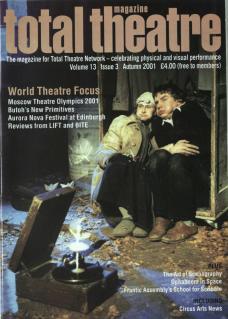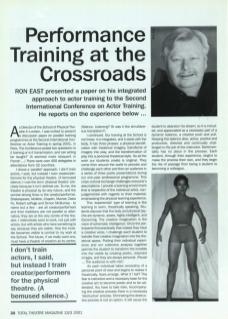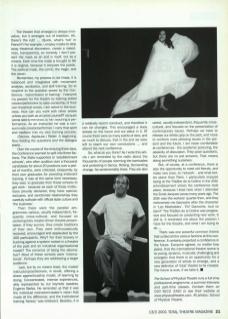As Director of the School of Physical Theatre in London, I was invited to present a discussion paper on parallel training programmes at the Second International Conference on Actor Training in spring 2001, in Paris. The conference posed two questions: is it training or is it transmission, and can acting be taught? (It seemed more eloquent in French...) There were over 400 delegates in attendance from 32 countries.
I chose a 'parallel' approach. I don't train actors, I said, but instead I train creator/performers for the physical theatre. (A bemused silence.) I use the term ‘physical theatre’ precisely because it isn't defined yet. To me, the theatre is physical by its very nature, and the central driving force is the creator/performer. Shakespeare, Molière, Chaplin, Mamet, Dario Fo, Robert Lepage and Simon McBurney – to name but a few – are all creator/performers and their traditions are not parallel or alternative; they are at the very centre of the theatre. I instinctively want to work, not just with actors, but with artists who have something to say, because they are visible. How the invisible becomes visible is central to my work at the School. The future, if we really want one, must have a theatre of creation as its centre.
(Silence. Listening? Or was it the simultaneous translation?)
I continued. Our training at the School is not linear, it is integrated, and it starts with the body. It has three phases: a physical identification with theatrical imagery, transferral of imagery into play, and the transformation of play into a personal theatrical style. So all the work our students create is original. They come from around the world to provoke and challenge each other and then an audience in a series of three public presentations during our one-year professional programme. This cross-cultural exchange challenges everyone's assumptions. I provide a learning environment that is respectful of the individual artist, non-judgemental with regards to their material, emphasising the physical learning experience.
This ‘experiential' type of learning is like learning to swim, theatrically speaking. Students discover that the body and physical psyche are dynamic, aware, highly intelligent, and discerning. The creative imagination is the voice of schematic intelligence. Once the participants find practically that indeed they have a creative voice, I challenge each student to transfer their creative imagination into the theatrical space. Putting their individual experience and our collective analysis together permits the student to transform the invisible into the visible by creating poetic, resonant images, and they are always personal. (Pause... The audience is with me!)
As each individual takes ownership of a personal point of view and begins to realise it theatrically, fears emerge. What if I fail? This fear is instinctive and a necessary base for the creative act to become poetic and to be celebrated. You have to take risks. Accompanying the creative process there is a necessary 'destructive’ process. Eliminating this destructive process is not an option. It will cause the student to abandon his dream; so it is included, and appreciated as a necessary part of a dynamic balance, a creative push and pull. Keeping this balance alive, active, positive and productive, directed and continually challenged is the job of the instructor. Sentimentality has no place in the process. Each student, through their experience, begins to make the process their own, and they begin the rite of passage from being a student to becoming a colleague.
The theatre that emerges is always innovative, but it emerges out of tradition. Ah, there's the rub! ... (Quick, what's 'rub' in French?) For example, I employ masks to strip away theatrical decoration, create a nakedness, transparency, an honesty. I don't present the mask as an end in itself, but as a means. Each time the mask is brought to life it is original, because it conjures the poetic. The satirical mask, the comic, the tragic, and the clown.
Remember, my process is not linear, it is balanced and integrated with movement analysis, acrobatics, and skill training. So to respond to the question posed by the conference – transmission or training – I transmit my passion for the theatre by training skilled creator/performers to take ownership of their own theatrical voices. I am active in the business. How can you work with other artists unless you work as an artist yourself? Jacques Lecoq said to me once, to him teaching is performance. As an instructor he was a consummate creator/performer. I carry that spirit and tradition into my own training process.
(Silence. Applause.) Relief. A beginning. Now fielding the questions and the dialogue starts.
Over the course of the ensuing three days, the conference seemed to split into three factions. The State-supported or 'establishment schools', who often audition over a thousand candidates for about twenty positions over a period of months, were criticised, eloquently, by their own graduates for providing irrelevant training. It was at the same time necessary they said, to graduate from these schools to get work – because as each of these institutions proudly declared, they have special, exclusive, and sanctioned relationships they carefully cultivate with official state culture and ‘the business'.
Then there were the parallel programmes; various, usually independent, frequently cross-cultural, and focused on contemporary creator-driven theatre presentation. If they survive, they create traditions of their own. They were enthusiastically received, encouraged and applauded by the 400 participants. Why? For their bravery in bucking against a system rooted in a theatre of the past and an industrial organisational model? The romance of being the alternative? Most of these schools were 'international'. Perhaps they are addressing a larger audience.
Last, but by no means least, the master instructor/practitioners, in revolt, offering a direct apprenticeship model, of learning by doing – concentrated, intense experiences, ably represented by our keynote speaker, Eugenio Barba. He reminded us that it was the individual instructor/creator's vision that made all the difference, and the institutional training 'factory' was irrelevant. Besides, it is a relatively recent construct, and therefore it can be changed. This encouraged a lively debate on the future and our place in it. Of course there were so many points of view, and so much to discuss, that in the end we were left to reach our own conclusions... and attend the next conference.
So, what do you think? As I write this article I am reminded by the radio about the thousands of people storming the barricades and protesting in Genoa. Rioting. Demanding change. No sentimentality there. They are also varied, usually independent, frequently cross-cultural, and focused on the presentation of contemporary issues. Perhaps we have to release our artistic grip on the past, and move to confront more pressing issues in the present and the future. I am never comfortable at conferences – the academic posturing, the passivity of discussion. They pose questions, but there are no pat answers. That means doing something ourselves.
But, of course, at a conference, there is also the opportunity to meet old friends, and make new ones, to 'network' – and what better place than Paris. I particularly enjoyed being at the Théâtre de la Colline in the 20th arrondissement where the conference took place, because I lived here when I attended the Ecole Jacques Lecoq many years ago. The 20th was the workers' quarter then, and they nicknamed me Gavroche after the character in Les Misérables. 'Eh! Gavroche, tout va bien?' The Théâtre de la Colline was progressive and focused on presenting new work. It still is. It reminded me about the passion I have for the theatre, and what I am trying to do...
There was one powerful common theme that united all the various factions at this conference. It certainly projected a confidence in the future. Everyone agreed, no matter how jaded, that the international theatre scene is so young, dynamic, muscular, challenging and energetic that there is an opportunity for a new generation of artists to emerge, and a new definition of total theatre to be created. The future is ours, if we take it.
The School of Physical Theatre runs a full-time professional programme, a summer intensive and part-time classes. Contact them on 020 8215 3350 or see their website at www.physicaltheatre.com. All photos: School of Physical Theatre.


